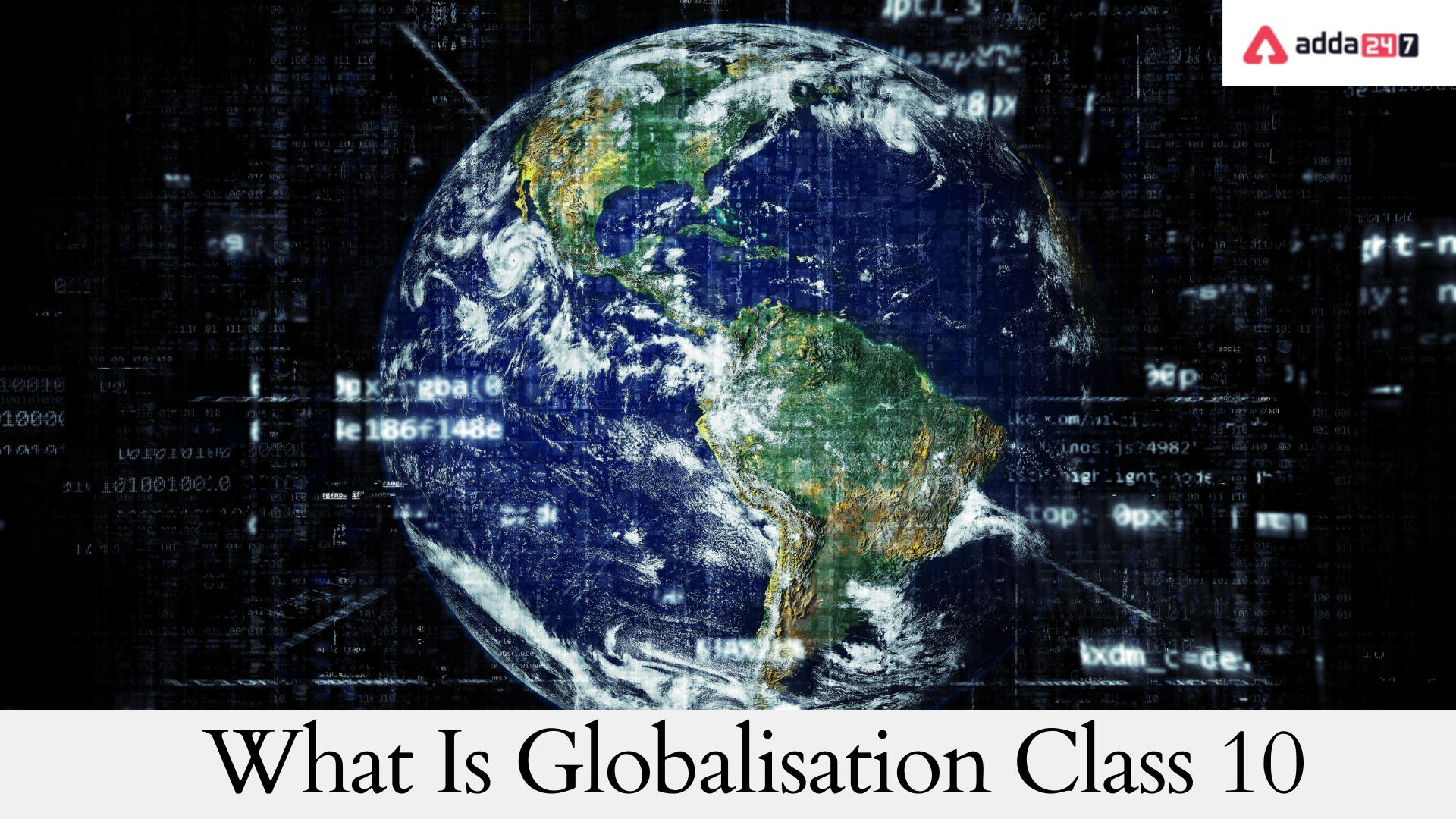Table of Contents
What is Globalisation?- Meaning in Economics
What is Globalisation?- Meaning in Economics is explained here. The integration of a country’s economy with the global economy is referred to as globalisation. It has a variety of facets. It is the end result of a variety of tactics aimed at changing the world in order to make it more interdependent and integrated.
It entails the development of networks and initiatives that break through social, economic, and geographic barriers. Globalization aims to create connections between events such that those happening far away can influence those happening in India.
In other words, globalisation is the process of interaction and union of individuals, organisations, and governments on a worldwide scale.
Join the Adda247 Saksham batch by clicking on this link.
What is Globalisation Effect in India?
The Effect of Globalisation in India – One of the nations that had tremendous success following the start and execution of globalisation is India. The country is seeing a huge increase in foreign investment in the corporate, retail, and scientific sectors.
Additionally, it had a significant impact on social, financial, cultural, and political spheres. Due to advancements in information technology and transportation, there has been a surge in globalisation recently. Global trade, doctrines, and culture are all growing as global synergies get better.
What is Globalisation In The Indian Economy in Simple words?
Indian society is undergoing significant change as a result of urbanisation and globalisation. The fundamental structure of the economy has been directly shaped by economic policy.
Government-created and -managed economic policies were crucial in determining the levels of societal savings, employment, income, and investments.
One of the most significant effects of globalisation on Indian society is cross-country culture. Cultural, social, political, and economic components of the nation have all undergone major transformation as a result.
The primary component, however, that transforms a nation’s economy into a global economy is economic unification.
Get your CUET preparation done with Adda247 online classes new CUET 2023 batch.
What is Globalisation?- Advantages of Globalisation in India
Increase in employment: Special economic zones (SEZ) have the potential to boost the number of new employment that are available. It is really helpful to include the export processing zones (EPZ) centre in India in order to employ thousands of people.
Another additional factor in India is cheap labour. This feature motivates the big companies in the west to outsource employees from other regions and cause more employment.
Increase in compensation: Due to the competence and knowledge a foreign company offers, compensation levels have improved since globalisation in comparison to domestic companies. The managerial structure changed as a result of this opportunity as well.
High standard of living: The growth of globalisation has improved both the Indian economy and the average person’s level of living. The purchase habits of an individual, particularly those connected to international businesses, are advised of this change. As a result, business development and a higher standard of living are occurring in many communities.
What is Globalisation Impact?- Explain
Outsourcing: One of the main outcomes of the globalisation strategy is this. In outsourcing, a business procures recurring services from external sources, frequently from foreign countries, that were previously implemented internally or from within the country (like computer service, legal advice, security, each presented by individual departments of the corporation, and advertisement).
Due to the development of speedy means of communication, particularly information technology, outsourcing has grown as a type of economic activity recently (IT).
Many services are being outsourced to India by businesses in developed nations, including voice-based business processes (also known as BPS, BPO, or call centres), accounting, record keeping, music recording, financial services, book transcribing, film editing, clinical counselling, and teaching.
Ace your preparation level with CLAT 2023 preparation batch.
What is Globalisation Class 10 in Hindi?
वैश्वीकरण क्या है? – अर्थशास्त्र में अर्थ यहाँ समझाया गया है। वैश्विक अर्थव्यवस्था के साथ किसी देश की अर्थव्यवस्था के एकीकरण को वैश्वीकरण के रूप में जाना जाता है। इसके कई तरह के पहलू हैं। यह दुनिया को और अधिक अन्योन्याश्रित और एकीकृत बनाने के उद्देश्य से विभिन्न प्रकार की युक्तियों का अंतिम परिणाम है।
इसमें नेटवर्क और पहलों का विकास शामिल है जो सामाजिक, आर्थिक और भौगोलिक बाधाओं को तोड़ते हैं। वैश्वीकरण का उद्देश्य घटनाओं के बीच संबंध बनाना है ताकि दूर होने वाली घटनाएं भारत में होने वाली घटनाओं को प्रभावित कर सकें।
दूसरे शब्दों में, वैश्वीकरण विश्वव्यापी पैमाने पर व्यक्तियों, संगठनों और सरकारों के परस्पर संपर्क और संघ की प्रक्रिया है।
भारत में वैश्वीकरण प्रभाव क्या है?
भारत में वैश्वीकरण का प्रभाव – वैश्वीकरण की शुरुआत और निष्पादन के बाद जिन राष्ट्रों को जबरदस्त सफलता मिली, उनमें से एक भारत है। देश में कॉरपोरेट, रिटेल और वैज्ञानिक क्षेत्रों में विदेशी निवेश में भारी वृद्धि देखी जा रही है।
इसके अतिरिक्त, इसका सामाजिक, वित्तीय, सांस्कृतिक और राजनीतिक क्षेत्रों पर महत्वपूर्ण प्रभाव पड़ा। सूचना प्रौद्योगिकी और परिवहन में प्रगति के कारण, हाल ही में वैश्वीकरण में उछाल आया है। वैश्विक व्यापार, सिद्धांत और संस्कृति सभी बढ़ रहे हैं क्योंकि वैश्विक तालमेल बेहतर हो रहा है।
सरल शब्दों में भारतीय अर्थव्यवस्था में वैश्वीकरण क्या है?
शहरीकरण और वैश्वीकरण के परिणामस्वरूप भारतीय समाज महत्वपूर्ण परिवर्तन के दौर से गुजर रहा है। अर्थव्यवस्था की मूलभूत संरचना को सीधे आर्थिक नीति द्वारा आकार दिया गया है।
सामाजिक बचत, रोजगार, आय और निवेश के स्तर को निर्धारित करने में सरकार द्वारा निर्मित और प्रबंधित आर्थिक नीतियां महत्वपूर्ण थीं।
भारतीय समाज पर वैश्वीकरण के सबसे महत्वपूर्ण प्रभावों में से एक क्रॉस-कंट्री कल्चर है। परिणामस्वरूप राष्ट्र के सांस्कृतिक, सामाजिक, राजनीतिक और आर्थिक घटकों में बड़े परिवर्तन हुए हैं।
हालाँकि, प्राथमिक घटक, जो किसी देश की अर्थव्यवस्था को वैश्विक अर्थव्यवस्था में बदल देता है, वह है आर्थिक एकीकरण।
वैश्वीकरण क्या है? – भारत में वैश्वीकरण के लाभ
रोजगार में वृद्धि: विशेष आर्थिक क्षेत्रों (एसईजेड) में उपलब्ध नए रोजगार की संख्या को बढ़ावा देने की क्षमता है। हजारों लोगों को रोजगार देने के लिए भारत में निर्यात प्रसंस्करण क्षेत्र (ईपीजेड) केंद्र को शामिल करना वास्तव में मददगार है।
भारत में एक और अतिरिक्त कारक सस्ता श्रम है। यह सुविधा पश्चिम की बड़ी कंपनियों को अन्य क्षेत्रों के कर्मचारियों को आउटसोर्स करने और अधिक रोजगार पैदा करने के लिए प्रेरित करती है।
मुआवजे में वृद्धि: एक विदेशी कंपनी की क्षमता और ज्ञान के कारण, घरेलू कंपनियों की तुलना में वैश्वीकरण के बाद से मुआवजे के स्तर में सुधार हुआ है। इस अवसर के परिणामस्वरूप प्रबंधकीय संरचना भी बदल गई।
उच्च जीवन स्तर: वैश्वीकरण के विकास ने भारतीय अर्थव्यवस्था और औसत व्यक्ति के जीवन स्तर दोनों में सुधार किया है। किसी व्यक्ति की खरीदारी की आदतों, विशेष रूप से अंतरराष्ट्रीय व्यवसायों से जुड़े लोगों को इस बदलाव की सलाह दी जाती है। नतीजतन, कई समुदायों में व्यवसाय विकास और उच्च जीवन स्तर हो रहा है।
Found this article helpful?
Reach us by means of visit or call our senior instructor at +91-9625869989 to figure out additional information about the various choices and streams that are open.
We would really see the value in it on the off chance that you could grant a portion of your insight. By utilizing our application, tests, and YouTube class help, you can unwind any vulnerability assuming that you’re centered around getting the best grades Adda247
What is Globalisation- FAQs
Question 1 What are the different kinds of globalisation?
Ans. The top five types of globalisation are:
- Financial globalisation.
- Economic globalisation.
- Technological globalisation.
- Political globalisation.
- Cultural globalisation.
Question 2 What are examples of Globalisation?
Ans. The two examples of globalisation are as follows:
- Travel: The capacity to travel to other places and experience their cultures.
- Transportation: The international transportation systems, such as air travel and shipping.
Question 3 What is the importance of Globalisation?
Ans. Globalisation is important to expand the markets and enable a business to make a sensible utilisation of the available resources. It also solves various issues of an individual and the nation, giving them many options to choose from and satisfy their needs. Globalisation boosts exports, discourages import, and uplifts foreign exchange.



 NEET City Intimation Slip 2025 Available...
NEET City Intimation Slip 2025 Available...
 BSE Telangana SSC Toppers List 2025: Che...
BSE Telangana SSC Toppers List 2025: Che...
 Manabadi TS SSC Results 2025 OUT, Check ...
Manabadi TS SSC Results 2025 OUT, Check ...

